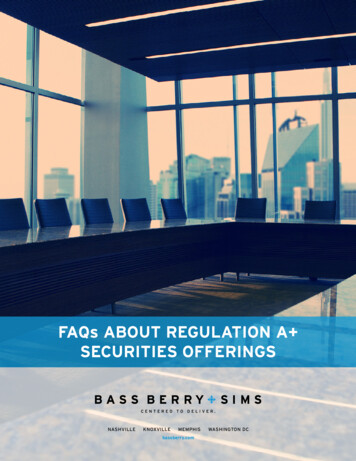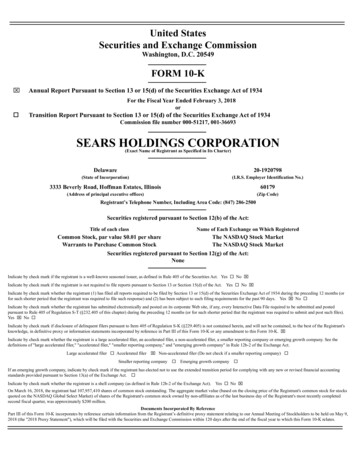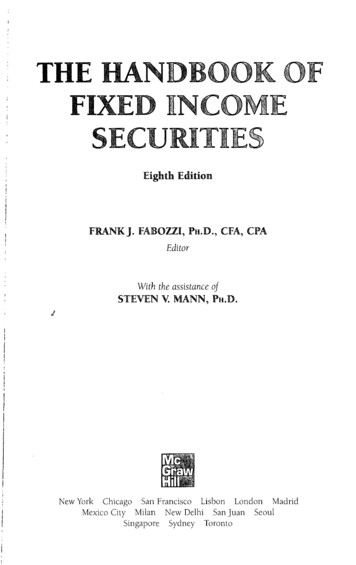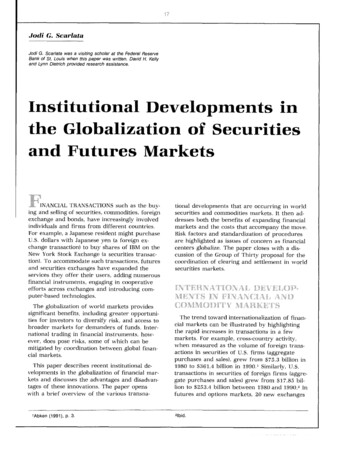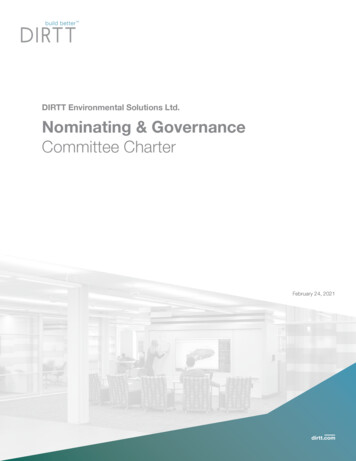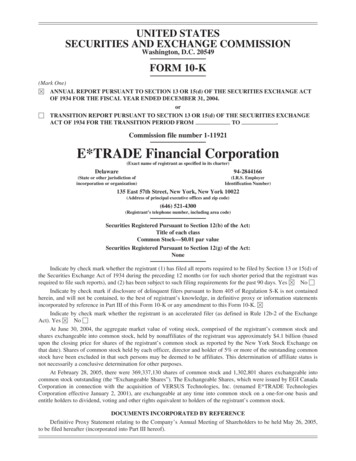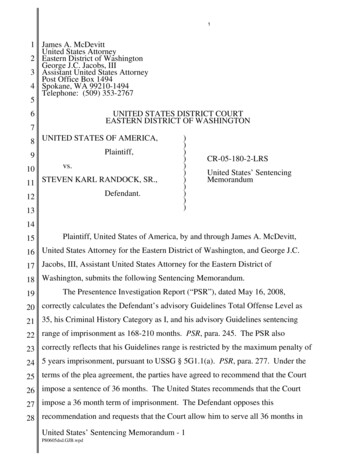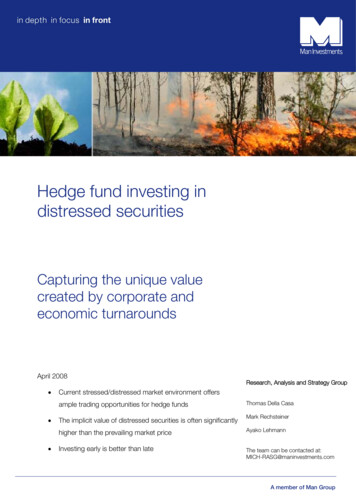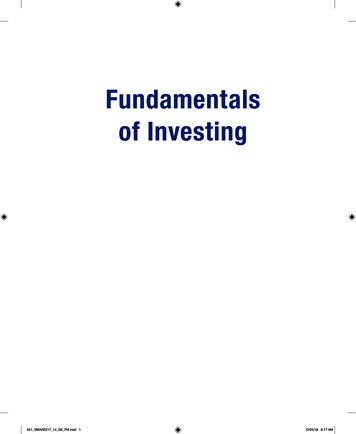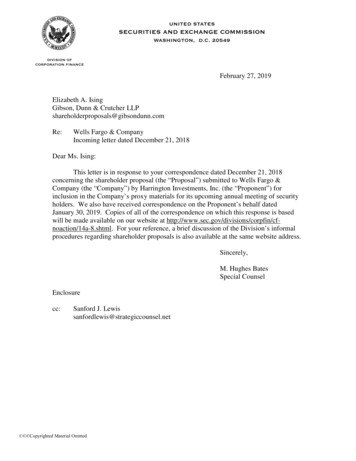
Transcription
UNITED STATESSECURITIES AND EXCHANGE COMMISSIONWASHINGTON ,D.C. 20549DIVISION OFCORPORATION FINANCEFebruary 27, 2019Elizabeth A. IsingGibson, Dunn & Crutcher LLPshareholderproposals@gibsondunn.comRe:Wells Fargo & CompanyIncoming letter dated December 21, 2018Dear Ms. Ising:This letter is in response to your correspondence dated December 21, 2018concerning the shareholder proposal (the “Proposal”) submitted to Wells Fargo &Company (the “Company”) by Harrington Investments, Inc. (the “Proponent”) forinclusion in the Company’s proxy materials for its upcoming annual meeting of securityholders. We also have received correspondence on the Proponent’s behalf datedJanuary 30, 2019. Copies of all of the correspondence on which this response is basedwill be made available on our website at a-8.shtml. For your reference, a brief discussion of the Division’s informalprocedures regarding shareholder proposals is also available at the same website address.Sincerely,M. Hughes BatesSpecial CounselEnclosurecc:Sanford J. Lewissanfordlewis@strategiccounsel.net Copyrighted Material Omitted
February 27, 2019Response of the Office of Chief CounselDivision of Corporation FinanceRe:Wells Fargo & CompanyIncoming letter dated December 21, 2018The Proposal requests that the board commission an independent study, includingrecommendations to shareholders regarding options for the board to amend theCompany’s governance documents to enhance fiduciary oversight of matters relating tocustomer service and satisfaction.There appears to be some basis for your view that the Company may exclude theProposal under rule 14a-8(i)(7) as relating to the Company’s ordinary businessoperations. In this regard, we note that the Proposal relates to decisions concerning theCompany’s customer relations. Accordingly, we will not recommend enforcement actionto the Commission if the Company omits the Proposal from its proxy materials inreliance on rule 14a-8(i)(7). In reaching this position, we have not found it necessary toaddress the alternative basis for omission upon which the Company relies.Sincerely,Michael KilloyAttorney-Adviser
DIVISION OF CORPORATION FINANCEINFORMAL PROCEDURES REGARDING SHAREHOLDER PROPOSALSThe Division of Corporation Finance believes that its responsibility with respectto matters arising under Rule 14a-8 [17 CFR 240.14a-8], as with other matters under theproxy rules, is to aid those who must comply with the rule by offering informal adviceand suggestions and to determine, initially, whether or not it may be appropriate in aparticular matter to recommend enforcement action to the Commission. In connectionwith a shareholder proposal under Rule 14a-8, the Division’s staff considers theinformation furnished to it by the company in support of its intention to exclude theproposal from the company’s proxy materials, as well as any information furnished bythe proponent or the proponent’s representative.Although Rule 14a-8(k) does not require any communications from shareholdersto the Commission’s staff, the staff will always consider information concerning allegedviolations of the statutes and rules administered by the Commission, including argumentsas to whether or not activities proposed to be taken would violate the statute or ruleinvolved. The receipt by the staff of such information, however, should not be construedas changing the staff’s informal procedures and proxy review into a formal or adversarialprocedure.It is important to note that the staff’s no-action responses to Rule 14a-8(j)submissions reflect only informal views. The determinations reached in these no-actionletters do not and cannot adjudicate the merits of a company’s position with respect to theproposal. Only a court such as a U.S. District Court can decide whether a company isobligated to include shareholder proposals in its proxy materials. Accordingly, adiscretionary determination not to recommend or take Commission enforcement actiondoes not preclude a proponent, or any shareholder of a company, from pursuing anyrights he or she may have against the company in court, should the company’smanagement omit the proposal from the company’s proxy materials.
SANFORD J. LEWIS, ATTORNEYJanuary 30, 2019Via electronic mailOffice of Chief CounselDivision of Corporation FinanceU.S. Securities and Exchange Commission100 F Street, N.E.Washington, D.C. 20549Re: Shareholder Proposal to Wells Fargo and Company Regarding Fiduciary Duty andConsumer Protection on Behalf of Harrington Investments, Inc.Ladies and Gentlemen:Harrington Investments, Inc. (the “Proponent”) is beneficial owner of common stock of WellsFargo and Company (the “Company”) and has submitted a shareholder proposal (the “Proposal”)to the Company. I have been asked by the Proponent to respond to the letter dated December 22,2018 ("Company Letter") sent to the Securities and Exchange Commission by Elizabeth A. Isingof Gibson Dunn. In that letter, the Company contends that the Proposal may be excluded fromthe Company’s 2019 proxy statement by virtue of Rule 14a-8(i)(10).I have reviewed the Proposal, as well as the letter sent by the Company, and based upon theforegoing, as well as the relevant rules, it is my opinion that the Proposal must be included in theCompany’s 2019 proxy materials and that it is not excludable by virtue of those rules. A copy ofthis letter is being emailed concurrently to Elizabeth Ising.SUMMARYThe proposal (Appended as Exhibit A) requests the Wells Fargo board of directors to commissionan independent study, including recommendations to shareholders regarding options for the board ofdirectors to amend our Company's governance documents to enhance fiduciary oversight of mattersrelating to customer service and satisfaction. In its supporting statement, the proposal notes that “Itis apparent that our Company is rapidly losing its ability to compete in banking because ofdisregard for lawful conduct. As a fiduciary, our directors need to fix a crippled business modeland restore Wells Fargo's reputation.”It is well documented in Delaware law that the language of governance documents can serve as avehicle for providing a contractual level of clarity regarding the responsibility and focus ofindividual board members. For instance, the responsibility to approve a report or policy of theCompany can be assigned to a committee, rather than to the board as a whole. See discussionbelow regarding decision of Delaware Supreme Court in In re Walt Disney Co. DerivativeLitigation, 906 A.2d 27, 53-54 (Del. 2006) (Appended as Appendix B) which described theduties of Disney's compensation committee as a "charter-imposed duty,” the consequences ofPO Box 231 Amherst, MA 01004-0231 sanfordlewis@strategiccounsel.net (413) 549-7333
Office of Chief CounselDivision of Corporation FinanceJanuary 30, 20192which was to allocate decision-making on compensation to the committee members rather thanthe board as a whole.As Wells Fargo has been reportedly finding it difficult to alter its corporate culture to imbuerespect for consumers, the Proposal seeks clearer lines of fiduciary responsibility and liability forfailures of due care. This represents an alternative fix to the company’s governance, which thecompany notably does not claim to have explored or implemented.Instead, the Company claims the proposal can be excluded pursuant to Rule 14a-8(i)(7)because the Proposal relates to the Company's ordinary business operations. Because theProposal addresses a significant policy issue that is also of obvious and even existentialimportance to the company, and the Proposal does not micromanage, the Proposal is notexcludable pursuant to Rule 14a-8(i)(7). The Proposal is correctly framed as a governanceinitiative that would encourage the Board of Directors to examine how fiduciary responsibilitiesare allocated.The Company claims the proposal can be excluded pursuant to Rule 14a-8(i)(3) because theProposal is impermissibly vague and indefinite so as to be inherently misleading. To the contrary,the Proposal including the supporting statement and whereas clauses provide sufficientinformation for shareholders and the Directors to understand the inquiry sought by the proposal.Neither shareholders nor the board would have difficulty understanding how the proposal can beimplemented, and yet the proposal leaves discretion to the Board to take such a study in anappropriate direction.BACKGROUNDAlthough it is the smallest of the four large companies now dominating US commercial banking,Wells Fargo has distinguished itself in the extent to which it has faced scandals over consumerdeception and egregious business misconduct. Multiple lawsuits have accused the Company ofracketeering and fraud; in 2016, the news broke that employees opened approximately twomillion accounts for customers without their permission; in 2017, another scandal broke,describing the bank’s enrollment of about 570,000 auto loan borrowers in “extra” collisioninsurance unbeknownst to the borrowers, which lead 20,000 customers to default and have theircars repossessed.All told, the Company has been required to pay more than 11 billion in fines and penalties since2000. These fines have directly impacted investor returns. While a small fraction of penaltieshave been imposed on selected employees, including some firings, shareholders have taken thelion’s share of loss.The severe implications for the company of these issues is demonstrated by the September 2017report1 (Appended as Appendix C) prepared by the Democratic Staff members of the house1THE CASE FOR HOLDING MEGABANKS ACCOUNTABLE: An Examination of Wells Fargo’s EgregiousConsumer Abuses, Report Prepared by the Democratic Staff of the Committee on Financial Services, U.S. House of
Office of Chief CounselDivision of Corporation FinanceJanuary 30, 20193Financial Services Committee under the direction of Maxine Waters (hereafter “FinancialServices Committee Report or “Waters Report”) which directly raised the question:whether Wells Fargo deserves to continue operating certain retail business lines, or,more appropriately, given the laundry list of large-scale consumer abuses, continueoperating as a national bank and continue being afforded federal deposit insurance.The report further highlighted the impact of the abuses on investors:penalties imposed on megabanks are often actually paid by shareholders, not thechief executives and senior officials responsible for the wrongdoing at the institution.As such, while fines have resulted in bad publicity that may temporarily lower abank’s share prices, the leadership within these megabanks, who condoned or failedto stop the unlawful practices, are rarely, if ever, held personally accountable.And finally, the report noted that these consumer protection issues connect directly to issues ofsafety and soundness of the bank:Federal prudential banking regulators have acknowledged that violations ofconsumer protection laws can become safety and soundness issues for a bank. Inits consent order with Wells Fargo, the OCC noted as part of its findings that theagency identified certain “deficiencies and unsafe or unsound practices in theBank’s risk management and oversight of the Bank’s sales practices,”2 which ledto the fraudulent account scandal. And following the Wells Fargo enforcementaction, Chair Yellen of the Federal Reserve Board stated in her quarterly pressconference in September, 2016, that instances of consumer harm “can becomesafety and soundness issues,” and “[a]t least one of the lessons from thefinancial crisis, I think, is that abuses of consumers of the sort that we saw in thesubprime lending ultimately did become safety and soundness issues.”3The failings of culture and governance at Wells Fargo have led to a flood of articles and analysesinquiring as to what went wrong. These analyses highlight the failures of criminal law,boardroom culture, fiduciary duty and administrative and legislative oversight.There have been numerous Wells Fargo-focused policy commentaries discussing the failures ofcurrent mechanisms including criminal law for to produce better behavior from companies andboards. See David Dayen, “Give Wells Fargo the Corporate Death Penalty,” The New Republic(Aug. 1, 2017), available at: fargo-corporateRepresentatives, The Honorable Maxine Waters, Ranking Member, 115th Congress, First Session, September 29,2017.2Press Release, Office of the Comptroller of the Currency, “OCC Assesses Penalty Against Wells Fargo, OrdersRestitution for Unsafe or Unsound Sales Practices,” (Sept. 8, 2016), available at: ses/2016/nr-occ-2016-106.html.3See, Transcript of Chair Yellen’s Quarterly Press Conference on Monetary Policy and the Economy, (Sept. 21,2016), available at: OMCpresconf20160921.pdf.
Office of Chief CounselDivision of Corporation FinanceJanuary 30, 20194death-penalty; Patrick Radden Keefe, “Why Corrupt Bankers Avoid Jail,” New Yorker (July 31,2017), available at: corrupt-bankersavoid-jail; Kyle Noonan, “The Case for a Federal Corporate Charter Revocation Penalty,” TheGeorge Washington Law Review (Feb. 2012), available at: -Noonan.pdf; and The Honorable Jed S. Rakoff, “The FinancialCrisis: Why Have No High-Level Executives Been Prosecuted?” The New York Review of Books(Jan. 9, 2014), available at: al-crisis-why-noexecutive-prosecutions/.“Rotten barrel not rotten apples”Perhaps the most compelling critique of the Board of Directors efforts so far is that theCompany’s focus has been on the idea that the company had “a few rotten apples” - a fewemployees behaving badly. But as the company fired 5300 employees, it became clear thatsomething else was wrong - as one legal observer has characterized it: the barrel is rotting,not the apples.4 Better governance strategies - repair of the barrel, rather than pulling outmore apples, is needed to stem the damage.The Financial Services Committee report also raised questions regarding the fiduciary culture ofthe corporation, under which anti-consumer behaviors appear to die hard:However, in June 2016, when asked about the company’s aggressive cross-sellingculture, current Wells Fargo Chief Executive Officer Tim Sloan, who was then the bank’sChief Financial Officer, said that the company had not “pushed that strategy to the limit”and “the fundamental strategy that [Wells Fargo had was] not going to change.” WellsFargo’s executives and directors of the Board did not address the aggressive salespractices until after [a] September 8, 2016 regulatory enforcement action [by the OCC].Identified structural problem: under current rules highest-paid employees have morebenefits than risks in anti-consumer behaviorIn the book, Better Bankers, Better Banks: PROMOTING GOOD BUSINESS THROUGHCONTRACTUAL COMMITMENT5 [hereafter: Better Bankers] the authors6 assert that all of the4Susan S. Silbey, ‘Rotten Apples or a Rotting Barrel: How Not to Understand the Current Financial Crisis’, (2009)XXI No. 5 MIT Faculty Newsletter.5Claire A. Hill and Richard W. Painter, Better Bankers, Better Banks: PROMOTING GOOD BUSINESSTHROUGH CONTRACTUAL COMMITMENT, University of Chicago Press, 2015. All quotes herein are fromChapter 5.6The authors, Claire A. Hill and Richard W. Painter are distinguished corporate law professors at the University ofMinnesota. Claire A. Hill is professor and the James L. Krusemark Chair in Law at the University of Minnesota LawSchool, where she teaches corporate law, mergers and acquisitions, contracts, and a seminar in law and economics.She is the founding director of the Law School’s Institute for Law and Rationality, and the associate director of itsInstitute for Law and Economics. She is also an affiliated faculty member of the University’s Center forCognitive Sciences. Before becoming a law professor, she practiced corporate law at several law firms includingMilbank, Tweed, Hadley & McCloy in New York and Dickstein Shapiro in Washington D.C.Richard W. Painter is the S. Walter Richey Professor of Corporate Law at the University of Minnesota Law School.Painter received his B.A., summa cum laude, in history from Harvard University and his J.D. from Yale University,where he was an editor of the Yale Journal on Regulation. Following law school, he clerked for Judge John T.
Office of Chief CounselDivision of Corporation FinanceJanuary 30, 20195big banks have a structural problem associated with the incentives for their highest paidemployees.According to Better Bankers:Bankers now have incentives to take inappropriate financial risks with their banks’money and with customers’ and clients’ money, and to take legal risks in areas such asinstitutional safety and soundness, proprietary trading, compliance with tax laws andanti–money laundering laws, transactions with customers and clients, transactions withthird parties, and disclosure to investors.The core concept presented in Better Bankers is that establishing personal liability of the highestpaid employees of banks that are not connected to fault will change the culture of the bank in amanner that is more appropriately risk averse:Personal liability should encourage bankers to reduce these risks and, since theliability is not fault based, to monitor each other’s behavior to the same end.The approach suggested by Better Bankers is a contrast to current practices, including thepractices highlighted by the Company in response to its recent consumer fraud crisis.The May 2012 hearing of the House Financial Services Committee focusedon whether the SEC and other regulators should insist on an admission of wrongdoing insettlements. .Testifying at the hearing, Richard Painter [coauthor of Better Bankers] toldthe committee that the problem with many SEC settlements was not the lack of admissionof guilt as much as the fact that a penalty assessed against an entity is effectively paid byits shareholders. The shareholders neither caused the behavior that led to the fine nor werethey responsible for preventing it. The officers, by contrast, are only affected by thepenalty to the extent they are shareholders or indirectly, insofar as their bonuses are tied toearnings reduced by the penalty unless the directors take the rare step of removing them asa result of their behavior. They thus have less incentive to change their behavior or that ofthe bank than they would if they were personally liable for a portion of the fine.This incentive structure has led to the company moving employees around on the organizationalchart, rather than effectively addressing continuing culture, incentives and judgments by theboard – as noted in the Financial Services Committee report:Noonan Jr. of the United States Court of Appeals for the 9th Circuit and later practiced at Sullivan & Cromwell inNew York City and Finn Dixon & Herling in Stamford, Conn. From February 2005 to July 2007, he was associatecounsel to the president in the White House Counsel’s office, serving as the chief ethics lawyer for the president,White House employees, and senior nominees to Senate-confirmed positions in the executive branch. Painter hasalso been active in law reform efforts aimed at deterring securities fraud and improving ethics of corporate managersand lawyers. A key provision of the Sarbanes-Oxley Act of 2002, requiring the SEC to issue rules of professionalresponsibility for securities lawyers, was based on earlier proposals Painter made in law review articles and to theABA and the SEC. Professor Painter has on six occasions provided invited testimony before committees of the U.S.House of Representatives or the U.S. Senate on government ethics, securities litigation, and/or the role of attorneysin corporate governance.
Office of Chief CounselDivision of Corporation FinanceJanuary 30, 20196 .the decision of the board of Wells Fargo to elevate Tim Sloan to the chief executiveofficer position of the bank, even though he was the chief operating officer with directresponsibility for the actions of the bank’s employees during the fraudulent accountscandal, raises questions as to whether Wells Fargo’s board is serious about fixing theculture of the bank.The ProponentThe Proponent, Harrington Investments, Inc. is a manager of assets of individual and institutionalinvestors requiring social and environmental as well as financial portfolio performance. Our firmutilizes a comprehensive social and environmental screen and commits clients’ assets tocommunity investing. The firm also works to advance corporate financial and socialresponsibility through shareholder resolutions, addressing issues such as U.S. economic security,sustainability, human rights, corporate governance, and CEO compensation. We believe themanner in which these issues are managed affects long-term value creation and societal impact.Therefore, our investing and engagement strategy seeks to improve governance and oversight byclarifying corporate directors’ fiduciary duties on issues surfacing at their companies.Delineating fiduciary focus: and ongoing and successful initiative by the ProponentSince 2009, the Proponent has been working with companies in its portfolio to clarify thefiduciary duties of boards of directors to address environment and human rights.In 2010, Intel, Inc. agreed to amend its Charter of the Corporate Governance and NominatingCommittee to include “corporate responsibility and sustainability performance” in thecommittee’s overall policy responsibility.3 Intel also provided the proponent with an outside legalopinion by the law firm of Gibson Dunn & Crutcher stating that under Delaware Law directorshave a clear fiduciary duty to address corporate responsibility and sustainability performancewhen these issues are written into the committee charter.A Monsanto attorney confirmed for the Proponent, after Monsanto revised its committee charterto include sustainability, that the members of the Committee, as fiduciaries of the Company andits shareowners, have undertaken a duty to review and monitor the performance of the Companyas it affects matters relating to sustainability and to report thereon periodically to the full Boardof Directors of the Company.4Similarly, the Board of Directors of Target Corporation received an outside counsel opinion thatTarget, as a Minnesota Corporation, has a duty pursuant to Section 302A.241 of the MinnesotaBusiness Corporation Act to take actions that are set forth in any charter adopted by the Board ofDirectors setting forth the authority and responsibilities of such committee.Though not directly as a result of dialogue with the Proponent, Wells Fargo Corporation, whichhas recently been under fire for numerous failings in corporate responsibility, has clarified boardduties in a similar vein. On November 28, 2017, it amended its Corporate Responsibility
Office of Chief CounselDivision of Corporation FinanceJanuary 30, 20197Committee Charter to state:The CRC shall oversee the Company’s policies and programs related toenvironmental sustainability, human rights, and other social and publicmatters of significance to the Company, including the Company’ssupplier diversity initiatives.Clarifying these fiduciary duties of directors at a level of contractual clarity is a strong option forcompanies looking to demonstrate a top level, legally effective commitment to environment andhuman rights, as it provides a level of contractual clarity about the jurisdiction and responsibilityof directors. As an approach to portfolio companies, it is also relevant to institutional investorswho are seeking tools to address long-term value creation, and to mitigate portfolio companies’systemic or cross-portfolio impacts.In contrast to the exemplary actions by companies revising board of directors charters, otherfirms are reticent to make such changes. Conversations with corporate secretaries and boardshave indicated that, indeed, some boards are uncomfortable with revising corporate governancedocuments, precisely because they do not wish to add clearly articulated legal duties onenvironment or human rights, possibly increasing the likelihood that a director could be liable fora related duty of care, good faith or loyalty in oversight. Limiting the articulation of such issuesto voluntary principles, codes or sustainability reports, does not necessarily have the same legalimpact of expanding the scope of board fiduciary duties.Focusing fiduciary duty: an explanation of Delaware law basis for the ProposalThe Proponent’s governance efforts to amend committee charters have been justified, in part, bylegal opinion of the Company’s own counsel. In the memo provided for Intel, Gibson Dunn noted:The fact that a board committee's duties can be defined through a committee charter wasacknowledged by the Delaware Supreme Court in In re Walt Disney Co. DerivativeLitigation, 906 A.2d 27, 53-54 (Del. 2006), which described the duties of Disney'scompensation committee as a "charter-imposed duty."At issue in the Walt Disney Company derivative litigation were allegations that an excessivesalary was paid to Michael Ovitz as executive president and director. Part of the litigation turnedon who had responsibility and fiduciary duty of care in determining appropriate compensationlevels. The court in the Walt Disney litigation noted:The Delaware General Corporation Law (DGCL) expressly empowers a board ofdirectors to appoint committees and to delegate to them a broad range ofresponsibilities,[69] which may include setting executive compensation. Nothing in theDGCL mandates that the entire board must make those decisions. At Disney, theresponsibility to consider and approve executive compensation was allocated to thecompensation committee, as distinguished from the full board. The Chancellor's ruling that executive compensation was to be fixed by the compensation committee is legally
Office of Chief CounselDivision of Corporation FinanceJanuary 30, 20198correct.***The compensation committee also had the charter-imposed duty to "approveemployment contracts, or contracts at will" for "all corporate officers who are membersof the Board of Directors regardless of salary."In examining the activities of the Walt Disney board, the court found that these allocations ofresponsibility in committee charters actually served to alleviate responsibility and liability ofsome board members by allocating it to others. But another way of understanding this is that itdemonstrates that fiduciary responsibilities can be FOCUSED and CLARIFIED through thevehicle of a charter. This is one way in which a Board of Directors may create clear lines ofresponsibility – a contractual level of clarity about who is responsible for overseeing and settingpolicy on an issue like consumer relations. The allocation of committee duties is also, asdemonstrated in In re Walt Disney, a delineation of liability.The rationale for the current proposal is that existing Wells Fargo responses do not go far enoughto enable the culture change that is needed to prevent future harm by the Company. A key findingfrom the Board’s Independent Investigation was that, amongst senior leadership, again and again,there was a “disinclination to see the problem as systemic”. The Proposal seeks an assessment ofan approach consistent with the company’s own findings, to consider steps to implement truesystemic change by examining potential tweaks to allocations of fiduciary responsibility.Fundamental accountability of the board and senior officers of the company is still lackingbecause federal banking regulators appear timid in their interventions. The Waters report notesthat: . the federal prudential banking regulators have also failed to hold the board ofdirectors and senior officers of the largest banks accountable (i.e., by removing themfrom their positions or holding them civilly liable) for their acts or omissions thatcontributed to or enabled Wells Fargo’s repeated violations of federal consumerprotection laws.This Proposal, therefore, represents a governance intervention to strengthen the degree ofcontractual clarity regarding the scope and allocation of responsibility and focus among boardmembers and committees. The Walt Disney precedent cited above demonstrates that there ispotential for corporate governance documents to define and allocate the attention andresponsibility of board members to specific issues or decisions. Such charter- assignedresponsibilities can focus on the role of a board committee in review of reports or policies onbehalf of the board, and can also determine who has an approval capacity in relation to definedcorporate policy matters. It is of clear value to Wells Fargo investors to encourage our companyto better delineate and allocate responsibilities on the company’s consumer relations culture.
Office of Chief CounselDivision of Corporation FinanceJanuary 30, 20199ANALYSISI. The Proposal is not excludable as relating to ordinary business under Rule 14a-8(i)(7).As demonstrated in the background section of this letter, the Company’s mismanagement ofconsumer relations is a significant policy issue with dire significance for the Company. Theproponents and others believe that the problem has not been effectively addressed by otherefforts by the board and management to date. While the issue of consumer relations might, inother circumstances, be considered a mere matter of ordinary business, it represents anexistential question for this company – a question that the Democratic members of the Housefinancial services committee has expressed as: When a megabank has engaged in a pattern of extensive violations oflaw that harms millions of consumers, lik
customer service and satisfaction. There appears to be some basis for your view that the Company may exclude the Proposal under rule 14a-8(i)(7) as relating to the Company's ordinary business . duties of Disney's compensation committee as a "charter-imposed duty," the consequences of PO Box 231 Amherst, MA 01004-0231 sanfordlewis .

